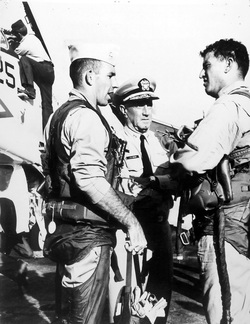How it left the world.

- The tensions started to ease on October 28.
- Established a telephone hot line that would allow leaders to contact one another easily.
- JFK was criticized that he was too young to be President, but his leadership skills during the crisis proved him to be a leader.
- The Cuban Missile crisis let the U.S. realized that they could not completely eradicate the influences of communism.
- Krushchev lost his prestige.
- China broke away from Russia.
- In 1963, the countries agreed to a Nuclear Test Ban Treaty.
- Cuba was the start of the end of the Cold War.
What the leaders learned.
“We saw as never before the meaning and responsibility in the power of the United
States, the power of the President, the responsibility we had to people around the globe
who had never heard of us, who had never heard of our country or of the men sitting in
that room determining their fate, making a decision which would influence whether they
would live or die.”
Robert F. Kennedy, “Thirteen Day: A Memoir of the Cuban Missile Crisis”
“I found myself in the difficult position of having to decide on a course of action which
would answer the American threat but which would also avoid war. Any fool can start a
war, and once he’s done so, even the wisest of men are helpless to stop it –especially if
it’s a nuclear war.”
Nikita Khrushchev, "Khrushchev Remembers"
States, the power of the President, the responsibility we had to people around the globe
who had never heard of us, who had never heard of our country or of the men sitting in
that room determining their fate, making a decision which would influence whether they
would live or die.”
Robert F. Kennedy, “Thirteen Day: A Memoir of the Cuban Missile Crisis”
“I found myself in the difficult position of having to decide on a course of action which
would answer the American threat but which would also avoid war. Any fool can start a
war, and once he’s done so, even the wisest of men are helpless to stop it –especially if
it’s a nuclear war.”
Nikita Khrushchev, "Khrushchev Remembers"
